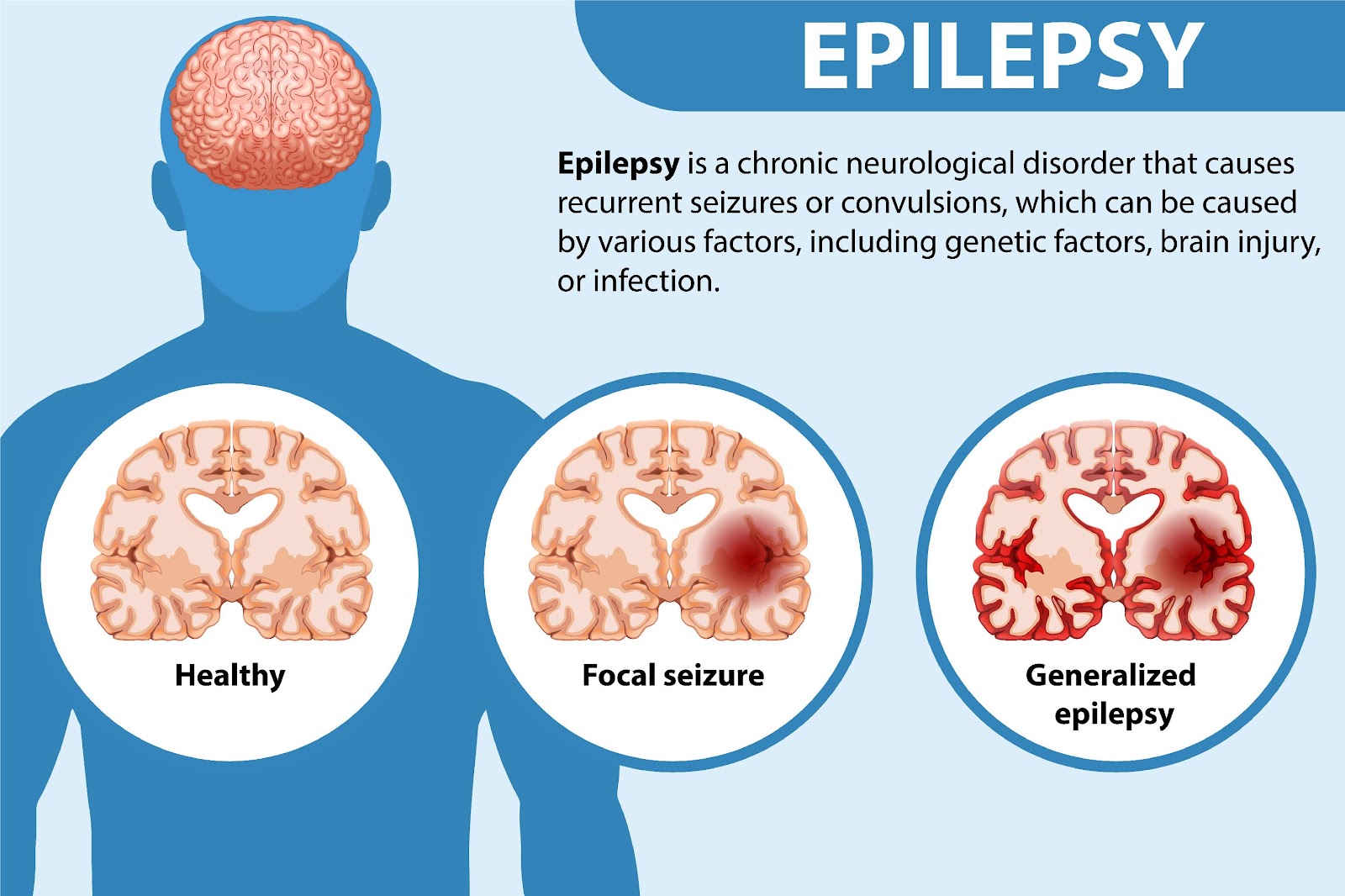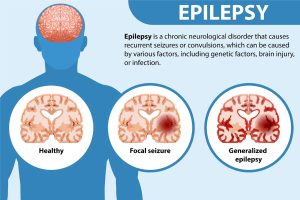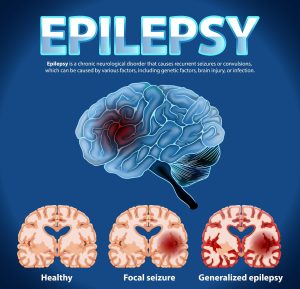Disclaimer:
This article is for information purposes only. It is not a substitute for medical advice or treatment. Seek medical care for your treatment.
Epilepsy:
Epilepsy is a long-term, neurological disease that generates recurrent seizures due to faulty electrical signals caused by injured cells. A seizure is an abrupt rush of abnormal, uncontrolled electrical activity in your brain. Seizures can cause changes to your awareness, muscle control, sensations, emotions and behavior. Doctors determine epilepsy when a person has two or more seizures with no noticeable cause.
Who can get epilepsy?
According to WHO, almost 50 million people are affected by epilepsy around the world and probably 3.5 million people in the United States, per the Centers for Disease Control and prevention. Mostly young children and older adults get epilepsy. Men are more likely to develop epilepsy than women because of their greater exposure to the factors like alcohol use and head trauma.
Types of seizures:
There are two main types of seizures:
- Generalized seizures:
Generalized seizures affect your whole brain.
- Focal or partial seizures:
Focal seizures affect only one part of your brain.
A mild seizure is hard to identify. It may stay a few seconds and you may remain conscious while it happens. Uncontrollable muscle twitches and spasms can be caused by stronger seizures. Later, you may have no recollection of a seizure happening. There is no cure for epilepsy but it can be controlled with medications and other methods.
What are the causes of Epilepsy?
There is no discernible cause in half of the people with epilepsy. In the other half, the condition may be found through various factors, including:
- Genetic influence: certain types of epilepsy run in families. In this case it is likely that there is a genetic influence. Researches have linked certain types of epilepsy to specific genes. But some people have genetic epilepsy that is not hereditary. Genetic modifications can happen in a child without being passed on from the parent. Mostly genes are part of the cause of epilepsy. Some genes may make a person more responsive to environmental conditions that aggravate seizures.
- Factors in the brain: brain tumors result in epilepsy. Onset of epilepsy is caused by the way blood vessels develop in the brain. People with blood vessel conditions like arterivenous malformations and cavernous malformations can lead to seizures. Stroke is the prime cause of epilepsy in adult’s older than 35 years of age.
- Infections: meningitis, HIV, viral encephalitis and some parasitic infections can cause epilepsy.
- Head injuries: epilepsy can be caused by a car accident or other traumatic injury.
- Birth abnormalities: before the birth, babies are sensitive to brain injury that could be caused by various factors. They might include an infection in the mother, malnutrition or insufficient oxygen. Epilepsy or cerebral palsy can be caused by this brain damage.
- Development conditions: at times epilepsy can happen with developmental conditions. People with autism are expected more to have an epilepsy than are people without autism. Research shows that people with epilepsy have more chances to get attention-deficit/hyperactivity disorder and other developmental conditions. Having both the conditions can be linked to genes.
- Brain vessel abnormalities: brain tumors, strokes, dementia and abnormal blood vessels like arteriovenous malformations can cause epilepsy.
- Mesial temporal sclerosis: this is a scar that develops in the inner part of your temporal lobe that can lead to focal seizures.
Symptoms of Epilepsy:
Symptoms vary from person to person and according to the type of seizure. Seizures are the prime symptom of epilepsy.
- Focal seizures:
There is no loss of consciousness linked with a focal aware seizure previously known as a simple partial seizure. Among the symptoms are:
- Changes in taste, smell, sight, hearing and touch
- Dizziness
- Tingling and trembling of limbs
Loss of awareness or consciousness is a characteristic of focal unaware seizures formerly known as complex partial seizures. Further signs and symptoms consist of:
- Staring
- Unresponsiveness
- Doing repetitive movements or actions
Generalized seizures:
Generalized seizures involve the whole brain. Generalized seizures Sub types and their symptoms include:
- Absence seizures: previously, absence seizures were called as “petit mal seizures.” They frequently result in a momentary loss of consciousness, a blank stare, and sometimes even repetitive motions like blinking or lip-smacking.
- Tonic seizures: tonic seizures lead to sudden muscle rigidness in your legs, arms or trunk.
- Atonic seizures: atonic seizures cause loss of muscle control. They are also called “drop seizures” because a sudden loss of muscle strength can make you fall abruptly.
- Clonic seizures: clonic seizures are marked by recurrent, shaky muscle movements of the face, neck and arms.
- Myoclonic seizures: myoclonic seizures cause abrupt prompt twitching of arms and legs. Sometimes these seizures clump together.
- Tonic-clonic seizures: tonic-clonic seizures used to be called “grand mal seizure”. Symptoms are:
- body stiffening
- trembling
- loss of bladder or bowel control
- tongue biting
- unconsciousness
Conclusion:
One in every 26 Americans will experience epilepsy at some point in their lifetime, making it a fairly common condition. Numerous therapies are available, such as anti-seizure drugs, particular diets, epilepsy surgeries, and seizure-stopping devices. Managing seizures as much as possible is the aim. Epilepsy can sometimes be a chronic condition. For others, with the right care, seizures may cease. You have some control over how well you handle your seizures. Aim for a healthy diet, reduced alcohol consumption, get plenty of sleep, abstain from things that make you more likely to have seizures, and take your medication exactly as prescribed by your doctor.



